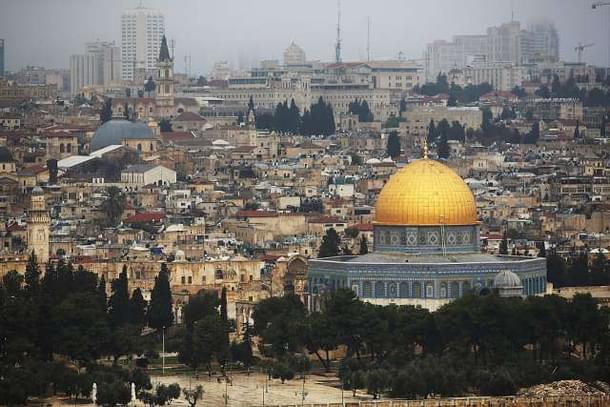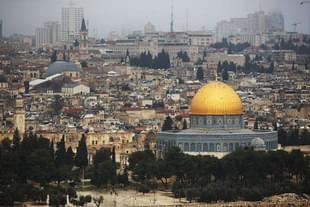Ideas
Did This Rabbi, Who Taught At BHU, Suggest A Novel Way To Reconcile Theological Conflict Within Abrahamic Faiths?
Aravindan Neelakandan
Apr 17, 2025, 09:54 PM | Updated 09:54 PM IST
Save & read from anywhere!
Bookmark stories for easy access on any device or the Swarajya app.


On March 18, 2025, the UK-Israel All-Party Parliamentary Group (APPG) published a report on the Hamas-led atrocities in southern Israel on October 7, 2023.
It was the result of a year-long investigation that began in January 2024. The report revealed horrors which should shame all humanity:
The youngest victim of 7 October was just 14 hours old – her mother had been shot whilst driving to the hospital to give birth and a bullet hit the baby girl’s leg whilst in utero. The oldest victim was a 92-year-old Holocaust survivor, who was killed at Kibbutz Holit.
In retaliation to this planned massacre of 1,195 people and taking of hostages which included women and even toddlers, Israel launched Operation 'Swords of Iron'.
The operation aimed to neutralise Hamas and involved extensive airstrikes and a ground offensive. According to Hamas-controlled Gaza’s Health Ministry, over 41,000 Palestinians had died, including many civilians, women, and children.
While Israeli strikes on Al-Shifa drew global criticism, Israel pointed out with evidence that Hamas had been using these sites as military bases consisting of tunnels and weapons caches.
Many global human rights agencies widely viewed the operation as disproportionate, while Israel maintained it was necessary for security. Hamas actually endangered the lives of its own population by embedding military assets in civilian areas, a fact exposed multiple times. On April 6, Israeli Defence Forces (IDF) updated their own combat causalities at 846.
All said, irrespective of which side one’s sympathies are with, the human lives lost and misery created in families is heart wrenching.
Israel has undertaken bold and substantive initiatives toward peace, often at significant political cost. The 'Camp David Accords' (1978) with Egypt and the 'Oslo Accords' (1993-1995) with the PLO reflect a willingness to compromise land for peace, with Israel ceding the Sinai Peninsula and portions of the West Bank to establish frameworks for Palestinian autonomy.
In 2005, the unilateral withdrawal from Gaza—uprooting 8,000 settlers—marked another daring step to de-escalate tensions, despite lacking a negotiated partner. These efforts, spanning prime ministers from diverse political backgrounds, carried the risk of domestic electoral backlashes.
In stark contrast, Hamas has entrenched itself in anti-Semitic hatred for Israel’s very existence. Its 1988 charter explicitly denies Israel’s right to exist, a stance only superficially softened in 2017 when it acknowledged the 1967 borders without recognizing Israel’s legitimacy.
Governance in Gaza under Hamas has prioritised militancy over welfare: rather than fostering education, it promotes anti-Semitic indoctrination; instead of building schools, it constructs tunnels; in place of quality housing, it embeds rocket launchers within civilian neighbourhoods. Hospitals, rather than being enhanced as medical sanctuaries, have been repurposed as ammunition depots and militant hubs.
Since seizing power in 2007, Hamas has consistently spurned peace negotiations, showing scant commitment to coexistence.
Against Israel’s tangible steps – even if there are criticisms- Hamas’s record reveals a deliberate choice to perpetuate hatred and conflict over pursuing mutual accommodation and coexistence.
In essence, Judaism, Christianity, and Islam share a common origin narrative, tracing their roots to a single divine source they each recognize, in their own terms, as the same God (or G_d as Jews say).
This shared sacred narrative, however, has ironically fuelled historical animosity towards Jews. A significant aspect of theologically driven anti-Semitism stems from theologies of supersessionism or fulfilment and displacement found within Christianity and Islam. These theologies present the daughter religions as successors to Judaism, with their covenants seen as replacing what some of their adherents consider an earlier, now superseded, agreement between God and the Jewish people.
In contrast, Judaism firmly maintains the enduring nature of its sacred relation to G_d. Consequently, the continued existence and vitality of the Jewish people as a distinct entity can present a theological tension for those religious worldviews based on fulfilment and replacement theologies.
For instance, medieval Christian theologian Augustine saw Jewish dispersion as proof of replacement of Jewish people by the Christian Church – the new Israel. So the persistence of Jews as an independent, thriving nation becomes a theological problem but in the secular present, particularly after Second World War, with explicit Anti-Semitism becoming problematic, the Palestinians problem is the political gloss over this core theological drive.
Even the Western Right-wing’s strong pro-Israel stance has its theological roots. In evangelical Christianity, the primary religious force driving the American political right, Jews are often seen as fulfilling prophecies tied to the Second Coming, yet full acceptance of Jews as Jews—without conversion—remains elusive.
For instance, Ann Coulter, a right-wing ideologue and vocal Republican Party supporter, stated in a 2007 CNBC interview: ‘We just want Jews to be perfected,’ implying that conversion to Christianity is essential.
Her view echoes a prevailing strand of evangelical thought, where support for Israel coexists with an underlying expectation of religious assimilation.
This theological tension underscores a broader challenge: the inability to embrace theo-diversity with mutual respect and coexistence, which perpetuates cycles of mindless violence.
To address this core issue, an alternative model of the sacred is perhaps urgently needed—one that transcends replacement narratives and fosters genuine acceptance across religious beliefs and theologies, offering a path beyond conflict.
Rabbi Alan Brill, a professor of inter-religious studies at Seton Hall University, offers an interesting perspective. As a Fulbright Senior Scholar, he taught at Banaras Hindu University in India, which led to his book Rabbi on the Ganges: A Jewish-Hindu Encounter (Lexington Books,2019).
In it, he imagines an alternative history for the Middle East. What if Ezra, a key religious figure in Jewish history, had not asked the Israelites to send away their foreign wives, including Moabites, in the 5th century BCE?
Prof. Brill speculates:
In this hypothetical counter-history, Ezra never asked anyone to put away foreign wives and never sought to limit foreign worship practices. Imagine, if he saw strength through including many different people and diverse practices in the Jerusalem cult.... In addition, Second Temple Judaism had priests, royalty, apocalyptic visionaries, Qumran, Sadducees, Nazerite ascetics and proto-rabbinic scribes. Historically only the writings of the scribes become the cultural resource for future Jews.... To consider later centuries, imagine that even when Judaism and Christianity divided, it still did not matter. Then imagine that Christianity never became the religion of the Roman Empire and just another offshoot of this complex Jerusalem religion.... Finally, imagine that this region from Greece to Iraq gains liberation as a single country in the middle of the twentieth century, with a government that is going out of its way to downplay differences and claim everyone is biblical.... Hinduism came to be in a similar fashion to my hypothetical biblical story.Rabbi on the Ganges: A Jewish-Hindu Encounter , 2019, pp.14-15
Of course Alan Brill does not recommend that Judaism adapt such a Hindu model. He is just explaining to his non-Hindu readers mostly rooted in Abrahamic framework of religion to understand the nature of diversity in Hinduism and how yet it is a unified religion.
Still, it raises a question: Could Christianity and Islam, the two dominant Abrahamic religions, adopt a similar approach and accept Judaism as a living, independent faith without trying to replace or convert it but accepting Judaism as the source from which they have branched out?
This idea of inclusiveness is not alien to Abrahamic tradition.
In Exodus 22:21, the Torah says, ‘You shall not wrong a stranger or oppress him, for you were strangers in the land of Egypt.’ The Hebrew word for ‘stranger’ here is ger, which can mean a foreigner living among the Israelites.
This verse calls for empathy—not just tolerance, but truly seeing the ‘other’ as one’s own self, even in a different social or religious context. The Israelites were strangers in Egypt, both culturally and religiously, and they faced oppression there. The Torah uses this experience to teach that they should treat outsiders—whether different in ethnicity, culture, or religion—with the same fairness and compassion they would want for themselves.
Israel, as the Jewish state, holds this empathy in her heart - a sacred principle woven into its secular foundation. Yet, as a nation engaged in conflict right from its inception, Israel is not immune to the frailties of statehood; lapses in its conduct, though real, are not its essence. Cruelty toward Palestinians, the dehumanization of a people, are not axiomatic to Israel’s being—if it happens, it is a deviation, a failure to live up to its own ideals and punishable under law.
In stark contrast, Israel’s enemies, such as Hamas, harbour a relentless and absolute hatred. To them, Israel is not merely a political adversary but a target for utter annihilation, a blight to be erased from the earth.
This unyielding enmity is not born solely of politics or land-claims—it is fuelled by a deep, theological core. For Hamas and various shades of Israel-phobics, the very existence of a Jewish state challenges their worldview, a theological affront that demands eradication.
This is the tragic chasm that divides them: where Israel, despite its imperfections, aspires to empathy, its foes embrace a hatred that knows no compromise.
By recognizing Judaism as their mother religion rather than a superseded covenant and seeing themselves as part of a broader Abrahamic family, they can shed the notion of being world-conquering religions. In doing so, they become members of a grand, shared spiritual lineage.
Adopting this approach could transform the very nature of the conflict, fostering dialogue over destruction. It paves the way for a future where peace reigns within the walls of every town—and prosperity within every house and healing to both Palestinians and Israelis alike.




